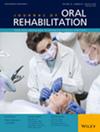Intraoral Factors Modulating Pain in Burning Mouth Syndrome
Abstract
Background
Understanding intraoral factors that modulate pain in patients with burning mouth syndrome (BMS) could provide insight into its pathophysiological mechanisms, facilitating improved management strategies.
Methods
This retrospective study included 120 BMS patients who were asked, without predefined options, about factors that alleviated or exacerbated their pain. Data collected included pain characteristics (intensity, localisation, duration) and associated conditions such as salivary abnormalities and taste disturbances.
Results
A total of 89.2% of patients reported that intraoral factors influenced their pain, while 10.8% experienced no change with local stimulation. Pain relief was reported by 69.7% of patients, primarily attributed to eating, chewing or sucking (91.6%) and to a lesser extent, consuming cold foods or drinks (20.5%). Pain aggravation was noted in 50.4% of patients, with 91.5% citing intraoral triggers such as acidic, spicy or salty foods, while 11.9% reported worsened pain with hot foods or drinks. No associations were found between pain-modulating factors and age, sex, disease duration, pain intensity or dysgeusia. However, pain relief was more frequent in patients without xerostomia, while those experiencing pain aggravation were more likely to have salivary abnormalities.
Conclusion
These findings indicate that intraoral factors can modulate pain intensity in the vast majority of BMS patients, supporting the role of the peripheral nervous system in BMS pathophysiology. Understanding these triggers may provide clinicians with valuable insights into the underlying mechanisms of pain, enabling more targeted and effective medical management.


 求助内容:
求助内容: 应助结果提醒方式:
应助结果提醒方式:


